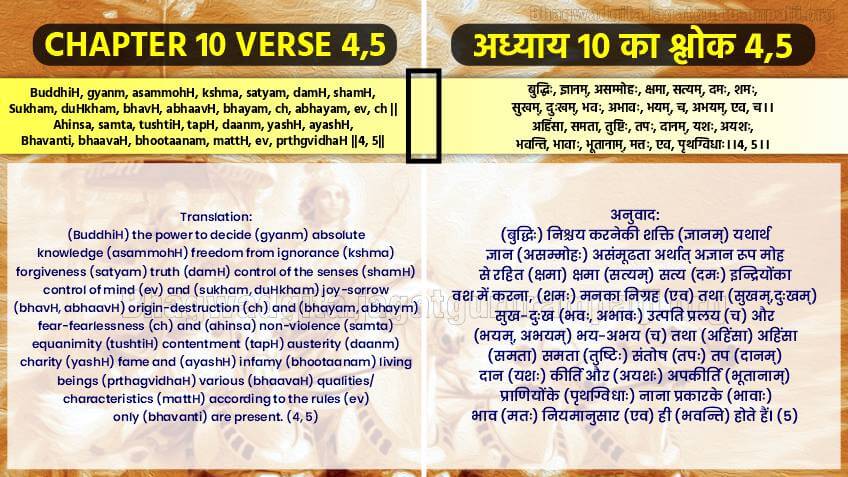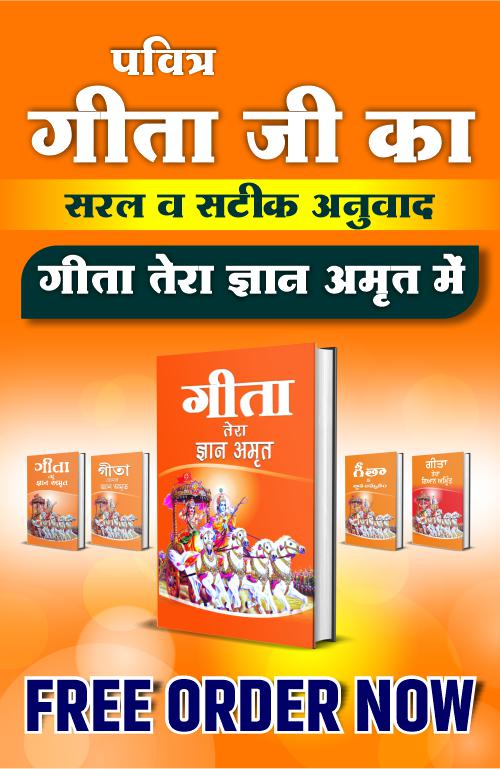
BuddhiH, gyanm, asammohH, kshma, satyam, damH, shamH,
Sukham, duHkham, bhavH, abhaavH, bhayam, ch, abhayam, ev, ch ||
Ahinsa, samta, tushtiH, tapH, daanm, yashH, ayashH,
Bhavanti, bhaavaH, bhootaanam, mattH, ev, prthgvidhaH ||4, 5||
Translation: (BuddhiH) the power to decide (gyanm) absolute knowledge (asammohH) freedom from ignorance (kshma) forgiveness (satyam) truth (damH) control of the senses (shamH) control of mind (ev) and (sukham, duHkham) joy-sorrow (bhavH, abhaavH) origin-destruction (ch) and (bhayam, abhaym) fear-fearlessness (ch) and (ahinsa) non-violence (samta) equanimity (tushtiH) contentment (tapH) austerity (daanm) charity (yashH) fame and (ayashH) infamy (bhootaanam) living beings (prthagvidhaH) various (bhaavaH) qualities/characteristics (mattH) according to the rules (ev) only (bhavanti) are present. (4, 5)
Translation
The power to decide, absolute knowledge, freedom from ignorance, forgiveness, truth, control of the senses, control of mind and joy-sorrow, origin-destruction and fear-fearlessness and non-violence, equanimity, contentment, austerity, charity, fame and infamy – the various characteristics of the living beings are present according to the rules.
बुद्धिः, ज्ञानम्, असम्मोहः, क्षमा, सत्यम्, दमः, शमः,
सुखम्, दुःखम्, भवः, अभावः, भयम्, च, अभयम्, एव, च।।
अहिंसा, समता, तुष्टिः, तपः, दानम्, यशः, अयशः,
भवन्ति, भावाः, भूतानाम्, मत्तः, एव, पृथग्विधाः।।4, 5।।
अनुवाद: (बुद्धिः) निश्चय करनेकी शक्ति (ज्ञानम्) यथार्थ ज्ञान (असम्मोहः) असंमूढता अर्थात् अज्ञान रूप मोह से रहित (क्षमा) क्षमा (सत्यम्) सत्य (दमः) इन्द्रियोंका वशमें करना, (शमः) मनका निग्रह (एव) तथा (सुखम्,दुःखम्) सुख-दुःख (भवः, अभावः) उत्पति प्रलय (च) और (भयम्, अभयम्) भय-अभय (च) तथा (अहिंसा) अहिंसा (समता) समता (तुष्टिः) संतोष (तपः) तप (दानम्) दान (यशः) कीर्ति और (अयशः) अपकीर्ति (भूतानाम्) प्राणियोंके (पृथग्विधाः) नाना प्रकारके (भावाः) भाव (मतः) नियमानुसार (एव) ही (भवन्ति) होते हैं। (5)
